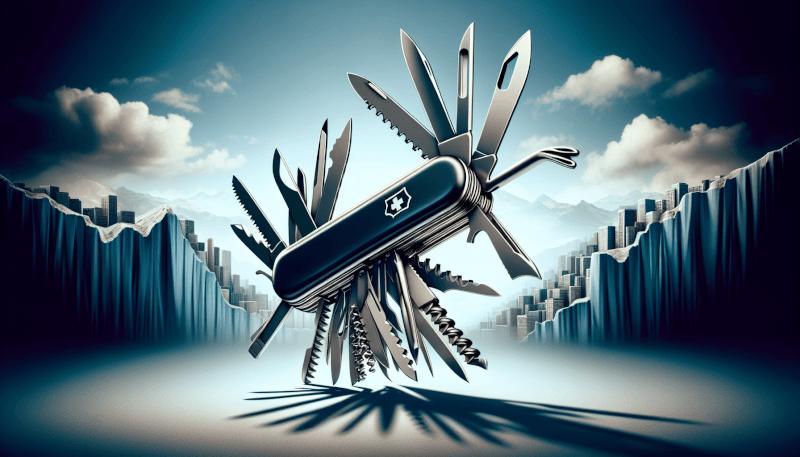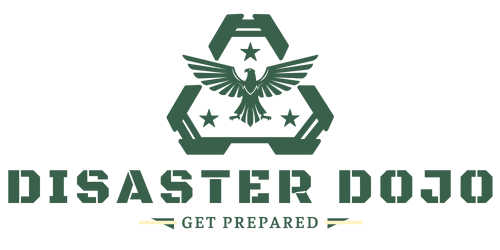In “The Modern Survival Manual: Surviving the Economic Collapse,” you will discover essential strategies to navigate through challenging times. Written in a friendly and accessible style, this book provides practical tips and expert advice to help you weather the storm of an economic downturn. From financial preparedness to self-defense techniques, this manual equips you with the knowledge and skills necessary to thrive amidst uncertainty. Get ready to become your own resilient guide and safeguard your future in an ever-changing world.

Understanding Economic Collapse
Understanding economic collapse is crucial in order to effectively prepare for and navigate through challenging times. Economic collapse refers to a severe and prolonged decline in the economy, characterized by a sharp decrease in economic activity, high unemployment rates, inflation, and a loss of confidence in the financial system. This article will explore the causes of economic collapse, signs of an impending collapse, and the impacts it can have on individuals and communities.
Causes of Economic Collapse
Economic collapses can be triggered by a variety of factors, including financial crises, market crashes, government mismanagement, excessive debt, and natural disasters. One common cause is a speculative bubble, where the value of certain assets, such as housing or stocks, become artificially inflated and eventually burst, leading to a collapse. Economic collapses can also be the result of systemic issues, such as corruption, income inequality, or a lack of economic diversification.
Signs of an Impending Economic Collapse
Recognizing the warning signs of an impending economic collapse can help individuals make informed decisions and take proactive measures to protect their finances and well-being. Some common indicators include increasing unemployment rates, declining stock markets, rising inflation, high levels of public and private debt, and a lack of consumer confidence. Additionally, political instability, currency devaluation, and a shrinking GDP are also potential signs of an impending economic collapse.
Impacts of Economic Collapse
The impacts of an economic collapse can be far-reaching and affect various aspects of individuals’ lives. Economic collapses often result in widespread job losses, leading to financial instability and increased poverty rates. Basic necessities, such as food, water, and healthcare, may become scarce and unaffordable for many people. Additionally, the collapse of financial institutions can result in the loss of savings and investments, further exacerbating the financial hardships faced by individuals. Social unrest, crime rates, and political turmoil are also common consequences of economic collapse.
Preparing for Economic Collapse
Preparing for an economic collapse involves a combination of financial planning, skill-building, and securing essential resources. By taking proactive steps to assess your current financial situation, create a financial emergency plan, develop resilient skills, stockpile essential supplies, and secure resources for barter and trade, you can increase your chances of weathering the storm during an economic collapse.
Assessing Your Current Financial Situation
Before preparing for an economic collapse, it’s essential to assess your current financial situation. Evaluate your income, expenses, and debts to determine your financial strengths and weaknesses. Consider creating a budget to track your expenses and identify areas where you can reduce spending. It’s also crucial to review your savings and investments to ensure they are diversified and protected.
Creating a Financial Emergency Plan
Having a financial emergency plan in place is crucial to navigate through an economic collapse. Start by building an emergency fund that can cover your essential expenses for several months. Consider diversifying your assets by investing in alternative forms of currency, such as gold or silver. It’s also important to establish a network of trusted financial advisors and professionals who can provide guidance during uncertain times.
Building Resilient Skills
In an economic collapse, certain skills become highly valuable, as traditional job markets may become unstable or scarce. Building resilient skills can enhance your ability to adapt and thrive in challenging circumstances. Consider learning practical skills such as gardening, home repair, and food preservation. Developing skills in healthcare, self-defense, and alternative energy can also be beneficial during a collapse.
Stockpiling Essential Supplies
Securing a stockpile of essential supplies is crucial in preparing for an economic collapse. Start by storing an ample supply of non-perishable food items, bottled water, and basic medical supplies. Consider investing in water filtration systems, alternative energy sources, and essential tools for self-sufficiency. It’s also important to replenish your supplies regularly and rotate perishable items to ensure freshness.
Securing Resources for Barter and Trade
During an economic collapse, the availability of traditional currency may become limited. Securing resources for barter and trade can provide alternative means of acquiring essential goods and services. Consider stocking up on items that are valuable and in high demand, such as precious metals, toiletries, batteries, and other everyday necessities. Building strong relationships and networks within your community can also help facilitate barter and trade exchanges.

Managing Your Finances during Economic Collapse
Managing your finances effectively during an economic collapse is crucial to ensure stability and meet your basic needs. Crafting a budget for survival, managing debt and prioritizing payments, exploring alternative income sources, and navigating the black market are key strategies to adopt during challenging times.
Crafting a Budget for Survival
During an economic collapse, it’s important to carefully allocate your resources to meet essential needs. Crafting a budget for survival involves prioritizing expenditures and identifying areas where you can cut costs. Focus on allocating funds for food, water, shelter, healthcare, and basic utilities. Reduce or eliminate discretionary spending and unnecessary expenses to stretch your resources further.
Managing Debt and Prioritizing Payments
If you have debt during an economic collapse, managing it effectively is crucial to avoid further financial distress. Prioritize your debts based on their importance and interest rates. Focus on paying off high-interest debts first, while ensuring you meet essential obligations such as mortgage or rent payments. Consider negotiating with creditors to modify repayment terms or seek professional advice if necessary.
Exploring Alternative Income Sources
During an economic collapse, traditional job markets may shrink or become unstable. Exploring alternative income sources can help ensure a steady flow of funds. Consider freelancing, starting a small business, or offering services to meet specific needs within your community. Expanding your skill set and adapting to emerging market demands can increase your opportunities for generating income during challenging times.
Navigating the Black Market
In the absence of traditional markets, a black market may emerge during an economic collapse. Navigating the black market requires caution and discretion. Be aware of local regulations and the risks associated with engaging in illicit activities. Exercise judgment and seek legal alternatives before resorting to the black market. Establishing trusted relationships within your community can facilitate safe transactions.
Securing Food and Water
Securing access to food and water is essential for survival during an economic collapse. By implementing strategies such as gardening and urban farming, preserving and storing food, finding alternative water sources, and utilizing water purification methods, you can ensure a sustainable supply of these critical resources.
Gardening and Urban Farming
Gardening and urban farming provide a reliable source of fresh produce during an economic collapse. Start by learning the basics of gardening, such as soil preparation, planting, and pest control. Utilize available space in your backyard, patio, or balcony to grow vegetables, fruits, and herbs. Consider practicing sustainable gardening techniques, such as composting and rainwater harvesting, to maximize productivity.
Preserving and Storing Food
Preserving and storing food is essential to maintain a long-term food supply during an economic collapse. Learn various food preservation methods, such as canning, dehydration, and fermenting, to extend the shelf life of perishable items. Stock up on non-perishable food items that have a long storage life, such as rice, beans, and canned goods. Utilize proper storage techniques, such as vacuum sealing and maintaining a cool, dry environment.
Finding Alternative Water Sources
Access to clean and safe water is vital for survival. In an economic collapse, traditional water sources may become compromised or limited. Explore alternative water sources, such as rainwater collection, wells, or nearby bodies of water. Install proper filtration and purification systems to ensure the water is free from contaminants. It’s important to regularly test the quality of your water sources and make necessary adjustments to ensure safety.
Water Purification Methods
If clean water is scarce during an economic collapse, water purification methods can help ensure a safe supply. Familiarize yourself with different purification techniques, such as boiling, chemical disinfection, and filtration. Invest in reliable water purification devices, such as portable filters or UV sterilizers. It’s crucial to follow proper guidelines and instructions to effectively purify water and prevent waterborne illnesses.

Maintaining Health and Sanitation
Maintaining health and sanitation practices is crucial to prevent the spread of diseases and ensure overall well-being during an economic collapse. By acquiring basic first aid skills, building a home first aid kit, implementing sanitation practices, ensuring a clean water supply, and effectively managing waste disposal, you can mitigate health risks and maintain a hygienic environment.
Basic First Aid Skills
Acquiring basic first aid skills is essential in a collapse situation where medical help may be limited or unavailable. Learn how to perform CPR, treat wounds, and manage common injuries and illnesses. Familiarize yourself with basic medical supplies, such as bandages, antiseptics, and pain relievers. Consider enrolling in first aid training courses to enhance your knowledge and confidence in handling medical emergencies.
Building a Home First Aid Kit
Having a well-stocked home first aid kit is crucial during an economic collapse. Ensure your first aid kit contains essential supplies such as bandages, gauze pads, adhesive tape, antiseptics, and over-the-counter medications for common ailments. Include items such as latex gloves, scissors, and tweezers for proper wound care. It’s important to regularly check and replenish your first aid kit to ensure its usability when needed.
Sanitation Practices in a Collapse
Maintaining proper sanitation practices is vital to prevent the spread of diseases and maintain a hygienic living environment during an economic collapse. Promote personal hygiene by practicing regular handwashing with soap and clean water. Properly dispose of waste and trash to prevent the accumulation of potential health hazards. Implement cleaning and disinfection routines for frequently touched surfaces to minimize the risk of contamination.
Ensuring Clean Water Supply
Access to clean water is essential for maintaining health and hygiene. During an economic collapse, water sources may become compromised or contaminated. Ensure a clean water supply by utilizing proper water purification methods, as discussed earlier. Conserve water by adopting efficient water usage practices, such as using low-flow fixtures and collecting and reusing graywater for non-potable purposes.
Dealing with Waste Disposal
Proper waste disposal is crucial for maintaining a sanitary and disease-free environment during an economic collapse. Develop an effective waste management system by segregating different types of waste and disposing of them accordingly. Compost organic waste to reduce waste volume and provide nutrient-rich soil for gardening. Dispose of hazardous waste, such as medical waste, batteries, and chemicals, in accordance with local regulations to prevent environmental contamination.
Protecting Yourself and Your Property
Ensuring personal safety and securing your property is crucial during times of economic collapse. By implementing home security measures, learning self-defense strategies, creating a bug-out plan, and forming community alliances, you can enhance your safety and security in challenging circumstances.
Home Security Measures
Implementing effective home security measures is essential to protect yourself and your property during an economic collapse. Secure your doors and windows with sturdy locks and reinforce weak entry points. Install a security alarm system and surveillance cameras to deter potential intruders. Consider establishing a neighborhood watch program to foster collective security and vigilance within your community.
Self-Defense Strategies
Learning self-defense strategies is crucial for personal safety during an economic collapse, especially when law enforcement may be limited. Enroll in self-defense classes to learn basic techniques for protecting yourself and your loved ones. Carry non-lethal self-defense tools, such as pepper spray or personal alarms, for added protection. It’s important to prioritize personal safety and avoid confrontations whenever possible.
Creating a Bug-Out Plan
Creating a bug-out plan involves preparing for the possibility of having to leave your home during an economic collapse. Identify potential evacuation routes and safe locations where you can seek shelter. Pack a bug-out bag containing essential items such as food, water, clothing, and important documents. Establish communication protocols with family members and establish meeting points in case you get separated.
Forming Community Alliances
Forming alliances with your community members is essential during an economic collapse. Establishing strong relationships and collaboration can enhance safety and security. Engage in community-building activities, such as neighborhood meetings or mutual aid groups, to foster trust and cooperation. By working together, you can share resources, knowledge, and support during challenging times.

Navigating a Cashless Society
In a potential cashless society following economic collapse, understanding digital currencies, preparing for digital payments, and utilizing barter and trade techniques can help individuals navigate the new economic landscape.
Understanding Digital Currencies
Digital currencies, such as cryptocurrencies, may become more prevalent in a cashless society. Educate yourself on different types of digital currencies and their potential advantages and risks. Familiarize yourself with blockchain technology, which underlies these currencies. Stay updated on the regulatory environment and security measures associated with digital currencies.
Preparing for Digital Payments
Preparing for digital payments involves acquiring the necessary tools and knowledge to conduct financial transactions electronically. Open a digital wallet or a bank account that supports digital payments. Familiarize yourself with various payment platforms and mobile banking applications. Ensure your devices are secure from cyber threats by using updated antivirus software and strong passwords.
Barter and Trade in a Cashless Economy
In a cashless economy, barter and trade become essential means of acquiring goods and services. Cultivate valuable skills or acquire goods that can be suitable for bartering. Establish connections within your community and participate in local barter networks or marketplaces. Communicate your needs and offerings clearly to facilitate efficient barter and trade exchanges.
Surviving Social and Political Unrest
Surviving social and political unrest during an economic collapse requires understanding group dynamics, managing stress and anxiety, and avoiding conflict and violence.
Understanding Group Dynamics in Crisis
During times of economic collapse, understanding group dynamics is crucial for social cohesion and collective action. Recognize the importance of strong leadership, effective communication, and collaboration within groups. Strive to build trust, empathy, and respect among group members. Promote a sense of community and support to foster resilience during challenging times.
Managing Stress and Anxiety
The uncertainty and challenges associated with economic collapse can be mentally and emotionally overwhelming. It’s important to prioritize self-care and stress reduction strategies to maintain mental well-being. Practice relaxation techniques, such as deep breathing or meditation, to alleviate stress. Engage in activities that bring joy and promote mental well-being, such as hobbies, exercise, or spending time outdoors.
Avoiding Conflict and Violence
Social and political unrest can lead to increased conflict and violence. Prioritize peaceful resolution and conflict management skills to avoid escalating tensions. Practice effective communication, active listening, and empathy when interacting with others. Avoid engaging in aggressive behavior and seek non-violent strategies for conflict resolution. Establish clear boundaries and practice self-defense techniques only as a last resort for personal safety.

Maintaining Mental and Emotional Well-being
During an economic collapse, maintaining mental and emotional well-being is essential for resilience. By practicing self-care and stress reduction techniques, building resilience and adaptability, and seeking support and connection, individuals can navigate through challenging times more effectively.
Self-Care and Stress Reduction
Self-care and stress reduction techniques play a vital role in maintaining mental and emotional well-being during an economic collapse. Prioritize self-care activities, such as getting enough sleep, eating nutritious meals, and engaging in regular exercise. Incorporate stress reduction practices, such as mindfulness or journaling, into your daily routine. Disconnect from negative news and media, and focus on activities that bring joy and relaxation.
Building Resilience and Adaptability
Building resilience and adaptability is crucial in navigating through the uncertainties of an economic collapse. Develop a positive mindset and embrace change as an opportunity for growth. Cultivate problem-solving skills and adopt a flexible approach to challenges. Seek opportunities to learn new skills and broaden your knowledge base. Surround yourself with supportive individuals who can provide motivation and encouragement.
Seeking Support and Connection
During difficult times, seeking support from others can provide invaluable emotional and practical assistance. Reach out to trusted friends, family members, or support groups to share your concerns and experiences. Offer your support to others and participate in community-driven initiatives. Building strong connections and fostering a sense of belonging can contribute to overall well-being and resilience.
Rebuilding and Thriving after Economic Collapse
After surviving an economic collapse, opportunities for rebuilding and thriving may emerge. Evaluating opportunities in the new economy, developing entrepreneurs and small businesses, and embracing sustainable living practices can contribute to long-term success and prosperity.
Evaluating Opportunities in the New Economy
An economic collapse can reshape the business landscape and create new opportunities. Evaluate emerging market trends and identify areas where your skills and interests align. Consider exploring industries that are more resistant to economic downturns, such as healthcare, renewable energy, or essential goods and services. Stay informed about government initiatives and support programs that can facilitate business development.
Developing Entrepreneurs and Small Businesses
Entrepreneurship and small businesses play a pivotal role in rebuilding after an economic collapse. Consider starting your own business or joining forces with like-minded individuals to create employment opportunities and contribute to the local economy. Develop a solid business plan, seek mentorship, and explore funding options available for small business development. Embrace innovation and adaptability to stay competitive in changing market conditions.
Sustainable Living Practices
Embracing sustainable living practices can promote long-term resilience and environmental stewardship. Consider incorporating eco-friendly habits into your daily life, such as conserving energy and water, reducing waste, and utilizing renewable resources. Invest in sustainable technologies, such as solar panels or rainwater harvesting systems, to reduce your environmental footprint. Support local and sustainable businesses to foster a resilient and sustainable economy.
By understanding the causes and signs of economic collapse, preparing for various scenarios, managing finances effectively, securing essential resources, building resilience, and embracing sustainable practices, individuals can navigate through and thrive in the face of challenging economic circumstances. Remember to adapt these strategies to your own unique situation and seek professional advice when needed. Stay informed, stay prepared, and stay resilient.


